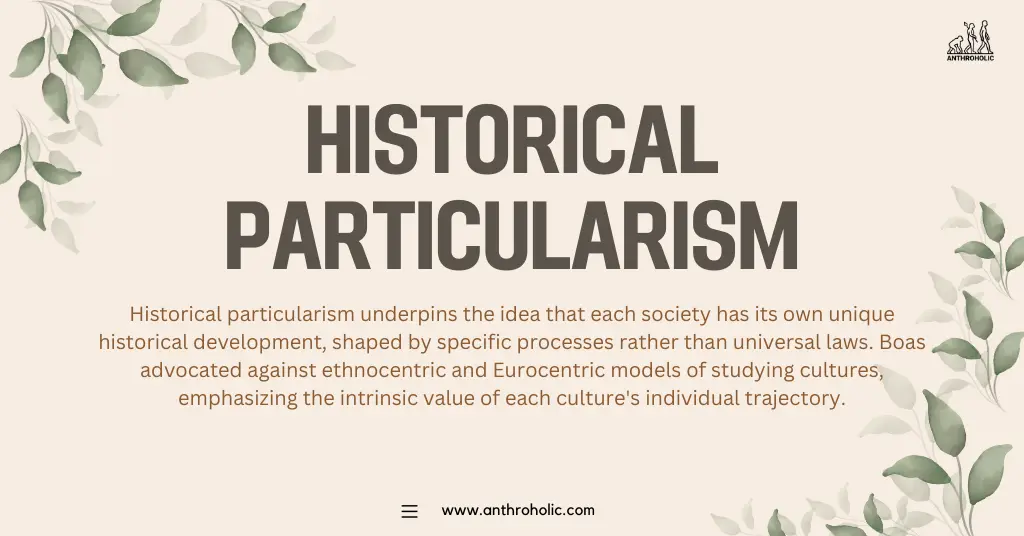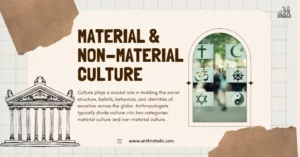AI Answer Evaluation Platform Live Now. Try Free Answer Evaluation Now
Historical particularism
Historical particularism, an anthropological perspective introduced by Franz Boas in the late 19th century, significantly altered the trajectory of anthropology. Known as the “father of American anthropology,” Boas emphasized the necessity of analyzing cultural phenomena in their unique historical and environmental contexts [1]. This principle broke away from existing theories, thereby creating a new pathway in anthropological research.

Defining Historical Particularism
Historical particularism underpins the idea that each society has its own unique historical development, shaped by specific processes rather than universal laws. Boas advocated against ethnocentric and Eurocentric models of studying cultures, emphasizing the intrinsic value of each culture’s individual trajectory [2]. He urged anthropologists to:
- Gather extensive data before formulating theories.
- Consider each culture as a unique entity.
- Recognize that comparison of cultures is inherently flawed.
| Boasian Principles | Description |
|---|---|
| Extensive Data Gathering | Prioritize fieldwork and direct data collection over preconceived notions. |
| Uniqueness of Cultures | Each culture has a unique trajectory, independent of other societies. |
| Flawed Comparisons | Direct comparison of cultures is often misleading due to unique contextual factors. |
Impact on Anthropological Theory
Historical particularism had far-reaching impacts on anthropological theory:
- Decentralization of Western Preeminence: It shifted the focus from a Eurocentric approach, recognizing the legitimacy of non-Western cultures [3].
- Cultural Relativism: It set the groundwork for cultural relativism, emphasizing that cultures should be judged by their own standards, not external ones [4].
- Development of Detailed Ethnographies: It championed the use of intensive fieldwork and rich ethnographies, leading to more accurate cultural representations.
Critiques and Limitations of Historical Particularism
While the influence of historical particularism is undeniable, critics highlight several limitations:
- Lack of General Theory: Critics argue that the focus on unique histories impedes the development of general theories for anthropological studies [5].
- Time-Consuming Research: The emphasis on intensive fieldwork and data collection is often criticized for being excessively time-consuming and unfeasible.
- Insufficient Cross-Cultural Comparison: The criticism of cultural comparisons has been seen as overly restrictive, hindering the potential for broader insights into human societies.
The Legacy of Historical Particularism
Despite the criticisms, the enduring legacy of historical particularism is clear:
- Foundation for Cultural Anthropology: The discipline of cultural anthropology owes much to historical particularism, which paved the way for the recognition of cultural diversity.
- Catalyst for Methodological Shifts: Boas’s insistence on fieldwork and rich ethnographic descriptions led to a significant shift in anthropological methodologies.
- Contributions to Cultural Relativism: It set the theoretical groundwork for cultural relativism, a key principle in modern anthropology.
Historical Particularism and Its Disciples
Boas’s ideologies inspired and influenced a number of his students, who themselves became prominent anthropologists. These include Alfred L. Kroeber, Robert Lowie, Edward Sapir, and Ruth Benedict. They all furthered the principles of historical particularism, while also bringing their unique perspectives to the field.
Alfred L. Kroeber
Kroeber, a student of Boas, was an advocate of the historical particularist viewpoint. He extended Boas’s ideas and focused on the concept of “culture areas” [6]. He hypothesized that certain geographic areas would have cultures with similar traits due to shared histories and environments. Kroeber’s work exemplifies the application of historical particularism on a wider geographic scale.
Robert Lowie
Lowie, another of Boas’s students, is best known for his work on social organizations. His studies highlighted the diversity of social structures and how they varied in different societies. Lowie argued against the imposition of Western social norms on other societies, reinforcing the principles of historical particularism [7].
Edward Sapir
Edward Sapir, while primarily known for his work in linguistics, also adopted and supported historical particularism. He focused on the interplay between language and culture, and how they evolve over time within specific contexts. His work further enriched the historical particularist tradition [8].
Ruth Benedict
Benedict, a contemporary and student of Boas, took historical particularism to another level by introducing the idea of ‘culture as personality writ large.’ Her work emphasized that, like an individual, each culture has a unique personality, hence, should be studied as a holistic entity [9].
Historical Particularism in Contemporary Anthropology
Historical particularism, while criticized for its lack of a generalized theory and seemingly tedious methodologies, remains crucial in contemporary anthropological thought.
- Increased Cultural Sensitivity: The focus on understanding cultures in their own context promotes cultural sensitivity and combats ethnocentrism [10].
- Recognizing Cultural Diversity: Historical particularism underscores the importance of recognizing cultural diversity and respecting different societal norms and values.
- Encouraging In-depth Fieldwork: The continued emphasis on ethnography and fieldwork has greatly enriched anthropological data, offering insights into cultures that might not have been otherwise understood.
Conclusion
Historical particularism, despite its shortcomings, reshaped anthropological thought. Its emphasis on the uniqueness of cultures, the value of fieldwork, and the limitations of cultural comparisons has profoundly influenced anthropology, laying the foundation for subsequent theories and methodologies. By refocusing the lens from a dominant Eurocentic perspective to a more inclusive, global viewpoint, historical particularism has forever enriched our understanding of human societies.
References
[1] Boas, F. (1940). Race, Language, and Culture. Chicago: University of Chicago Press. https://monoskop.org/images/8/8f/Boas_Franz_Race_Language_and_Culture_1940.pdf
[2] Stocking, G. W. (1966). Franz Boas and the Culture Concept in Historical Perspective. American Anthropologist, 68(5), 867-882.
[3] Lewis, H. S. (2001). The Passion of Franz Boas. American Anthropologist, 103(2), 447-467.
[4] Herskovits, M. J. (1955). Cultural Anthropology. New York: Knopf.
[5] Harris, M. (1968). The Rise of Anthropological Theory: A History of Theories of Culture. New York: Thomas Y. Crowell Co.
[6] Kroeber, A. L. (1939). Cultural and Natural Areas of Native North America. University of California Publications in American Archaeology and Ethnology 38.
[7] Lowie, R. (1948). Social Organization. Rinehart.
[8] Sapir, E. (1921). Language: An Introduction to the Study of Speech. Harcourt, Brace.
[9] Benedict, R. (1934). Patterns of Culture. Houghton Mifflin.
[10] Barnard, A. (2000). History and Theory in Anthropology. Cambridge University Press.




